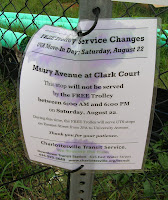
About half a mile from my house is a neat, newly-renovated, low-income apartment complex called Blue Ridge Commons.
Americorps runs an after school program and a summer program for the neighboring children in their Resident Center. The year-round volunteers are “Mr Mondo”, originally from the Congo and Melissa M, newly arrived in town from Jordan where she worked for the Peace Corps. A friend of mine, another Melissa, was a volunteer there for four months this spring and summer
The summer program takes place from Monday to Thursday afternoon. There is a story hour

followed by a snack. Then the volunteers plan a themed activity for an hour – or as long they can keep the children’s attention. Afterwards, they play outside in the new playground or go to the computer room.
I went with Melissa one afternoon to play with the kids. That week, their theme was music. They had written songs on the computer and made musical instruments during the week. I was going to sing with them. Monica, one of the residents, came that day, too, with her harmonica.
When I arrived, I said hello to Mr Mondo and Monica while Melissa got the snacks ready. Soon with a thunder of feet, ten kids aged from 3 to 13 came pelting down the stairs in a giggling mass. “This is Queen, this is Kiyah, this is Noureldin and Patrick and Abdellatif and Latifa……..” They grinned.
“Why don’t you start singing,” said Melissa as I was waiting, politely, for the children to finish their snack. “This is the quietest they’ll be!” So, I sang “Old MacDonald” The bigger kids sang with me and we all laughed at the crazy animal noises. I sang “Inky Pinky Spider” and “The Rainbow Song” which delighted all who knew the names of the colors. Then it was their turn. A stirring rendition of “Jinglebells” from one of the boys was followed by a rousing chorus of “Happy Birthday” from all and, after much hesitation, one of the girls sang a song she had written the day before -- safely hidden from view on the staircase.
Monica played a couple of lively tunes and we all got up and danced.

Eventually, one or two danced to the door and raced outside to the playground. Others followed and the musical activity was declared over.
The two Melissas went upstairs to the computer room with Patrick and Magali

I went outside with Mondo who was delighted to have someone to speak French to.

He told me about the tough life many of the kids had. About 60% of the residents are refugees from Rwanda, the Sudan, several other African countries and Myanmar. The others are African Americans, often looked after by their grandmother while the parents work or, more sadly, serve a term in prison. It’s easy to forget, when you see these giggling children at play, that they’ve already had more to deal with than most of us will ever experience. But, that sunny summer day, we shared a happy time. I wish them many more such days.

























